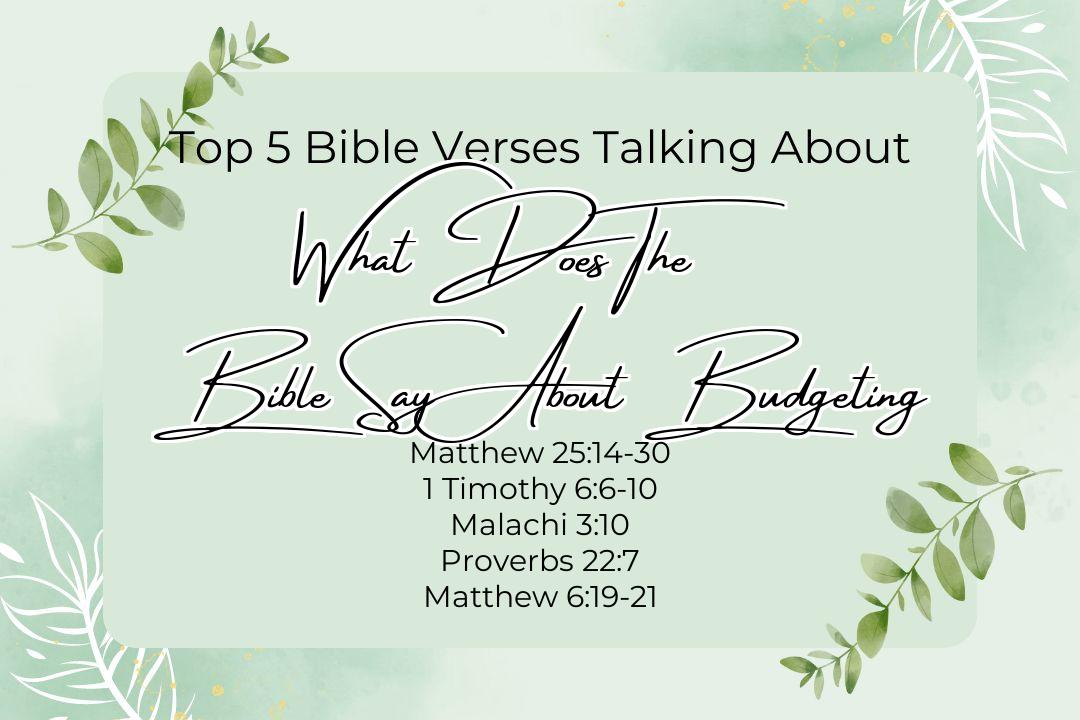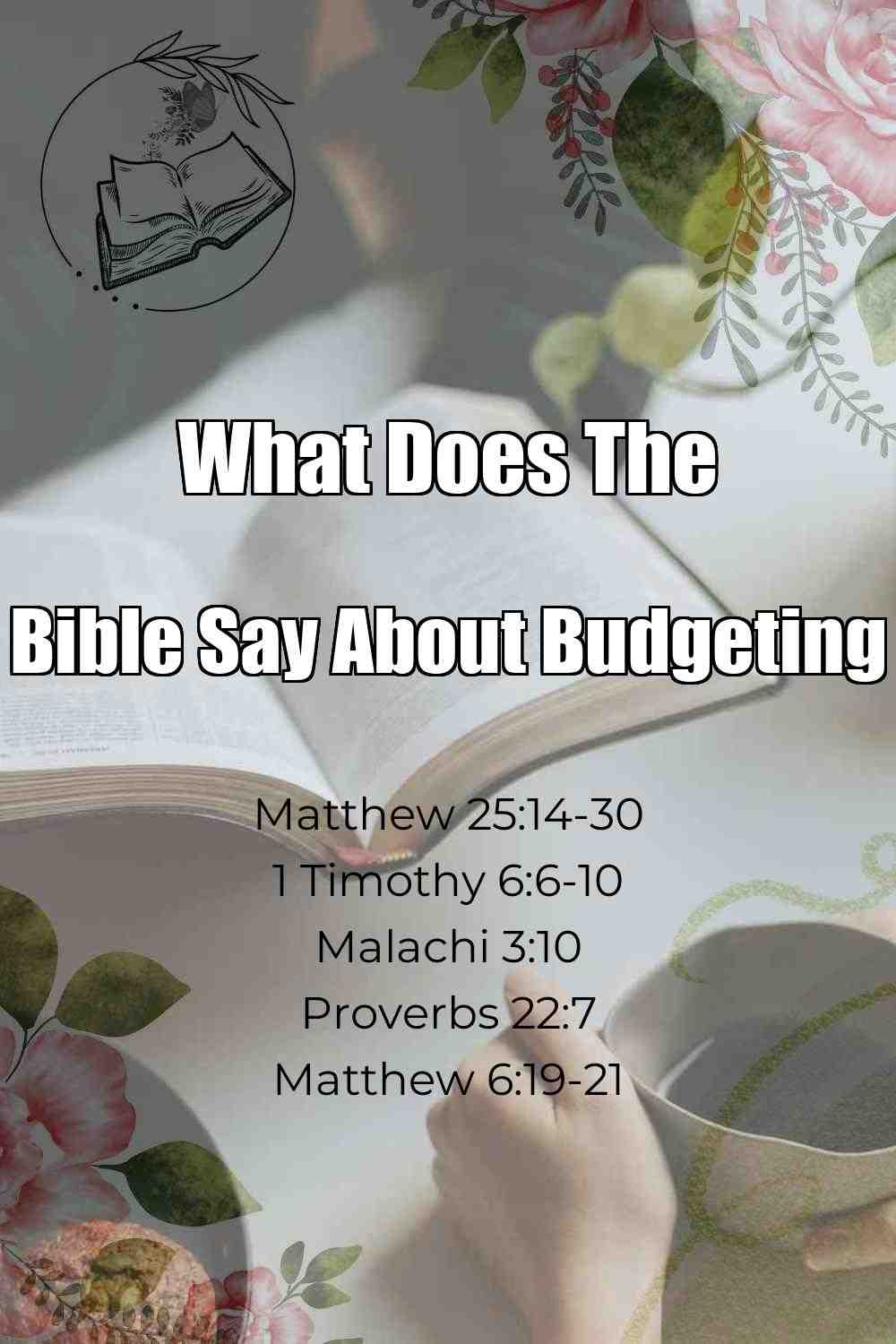Honestly, money’s one of those things that keeps me up at night – I mean, who doesn’t stress about it, right? I’ve always wondered, what’s the Bible’s take on handling our cash? I’m talking tithing, being generous, saving for a rainy day, investing in the future… all that jazz. Let’s dive in, see if we can’t dig up some biblical wisdom to help us make sense of our budgets and, you know, find a bit of financial peace.
Top 5 Bible Verses About What Does The Bible Say About Budgeting
I’ve been digging into scripture, and these passages have really helped me wrap my head around the whole budgeting thing. Honestly, I was surprised by how much the Bible has to say about managing our finances – some of these verses have been super insightful.

Picture by BibleBreathe.com about What Does The Bible Say About Budgeting
Biblical Principles for Budgeting
Stewardship and Responsibility with Finances
I’m sittin’ here, staring at my budget, and it hits me – managing my money isn’t just about scraping by, it’s about being a decent steward of what God’s given me.
The Bible says,
“For the kingdom of heaven is as a man travelling into a far country, who called his own servants, and delivered unto them his goods.” (Matthew 25:14, KJV).
This parable’s like, I’m not the owner of my wealth, I’m more like a manager, entrusted with God’s stuff. It’s on me to use it wisely, make it grow.
It’s kinda like when a friend lends me their car – I’m not the owner, but I gotta take care of it, return it in good condition. Same thing with God, He’s entrusted me with financial resources, and it’s my duty to manage ’em well.
Prioritizing Needs over Wants
But, like, how do I prioritize my spending? The Bible’s got some guidance on this too.
“But godliness with contentment is great gain. For we brought nothing into this world, and it is certain we can carry nothing out.” (1 Timothy 6:6-7, KJV).
This verse is like a reminder, true contentment comes from living a godly life, not from accumulating wealth. It helps me figure out what’s a need, what’s a want, and prioritize what’s really important.
For example, I might want a new smartphone, but do I really need it? Can I use that cash to pay off debt or save for a rainy day instead? By prioritizing my needs over my wants, I can live a more contented, financially responsible life.
Giving to God and Others
Lastly, the Bible teaches me giving to God and others is super important.
“Bring ye all the tithes into the storehouse, that there may be meat in mine house, and prove me now herewith, saith the Lord of hosts, if I will not open you the windows of heaven, and pour you out a blessing, that there shall not be room enough to receive it.” (Malachi 3:10, KJV).
Giving’s not just about writin’ a check; it’s about trustin’ God with my finances, acknowledging everything I have comes from Him. By giving to God and others, I’m not only obeyin’ His command, but also investin’ in eternal treasures that’ll outlast any earthly wealth.
Budgeting for Giving and Generosity
Tithing: The Biblical Basis
I’m sittin’ down to do my budget, and I’m reminded it’s not all about divvying up my cash for bills, savings, and debt. There’s more to it. The Bible says,
“And blessed be the most high God, which hath delivered thine enemies into thy hand. And he gave him tithes of all.” (Genesis 14:20, KJV).
This one verse is tellin’ me that tithing – givin’ 10% of my income to God – is a biblical principle that’s been around since, like, forever. I mean, Abraham was doin’ it. In Leviticus 27:30-32, it’s pretty clear that the tithe belongs to God, and it’s how I honor Him with my finances, you know?
Giving Beyond the Tithe
But tithing’s just the beginning, really. Jesus is all,
“If thou wilt be perfect, go and sell that thou hast, and give to the poor, and thou shalt have treasure in heaven: and come and follow me.” (Matthew 19:21, KJV).
This verse is like, a reminder that bein’ truly generous means givin’ more than what’s expected of me. And the Apostle Paul’s all about it too, tellin’ the Corinthian church to give freely, sayin’,
“Upon the first day of the week let every one of you lay by him in store, as God hath prospered him, that there be no gatherings when I come.” (1 Corinthians 16:2, KJV).
The Importance of Generosity in the Christian Life
So, why’s generosity such a big deal in the Christian life, anyway? Well, the Bible says the early church was all about generosity – people sellin’ their stuff and sharin’ with each other (Acts 2:44-45). And the Apostle Paul’s got a lot to say about it in 2 Corinthians 8:1-15, where he’s encouragin’ the Corinthian church to give to the poor in Jerusalem.
When I think about all this, I realize that budgetin’ for giving and generosity isn’t just about throwin’ some cash at a charity or whatever. It’s about growin’ a heart that’s generous, like God’s. By makin’ giving a priority in my budget, I’m not just doin’ what I’m supposed to do – I’m actually participatin’ in God’s work, helpin’ to make the world a better place, and all that.
Managing Debt and Financial Obligations

Photo modified by BibleBreathe.com. Original photo by Rod Long on Unsplash
The Dangers of Debt
Debt’s been a thorn in my side for years, I’m not gonna lie. I mean, who hasn’t struggled with it at some point, right? So, I figured it’s time to see what the Bible has to say about managing debt.
The Bible says,
“The rich ruleth over the poor, and the borrower is servant to the lender” (Proverbs 22:7, KJV).
Every time I read this verse, it’s like a punch to the gut. When we’re in debt, we’re basically handing over control of our lives to our lenders. It’s like, we’re giving them the reins to our finances, our time, our energy – everything. And honestly, debt can feel like this massive weight that’s crushing us.
Paying Off Debt and Financial Obligations
So, how do we break free from this cycle of debt? I mean, it’s not like we can just magic it away. Luckily, the Bible’s got some wisdom to share on this too.
The Bible says,
“The wicked borroweth, and payeth not again: but the righteous sheweth mercy, and giveth” (Psalm 37:21, KJV).
For me, this verse is all about living with integrity. When we make a commitment to pay off our debts, we’re showing that we’re responsible, that we’re people of our word. It’s not just about getting out of a financial hole; it’s about being trustworthy.
And then there’s what the apostle Paul wrote:
The Bible says,
“Owe no man any thing, but to love one another: for he that loveth another hath fulfilled the law” (Romans 13:8, KJV).
This verse is like a challenge to me – to live debt-free, not just financially, but in all my relationships too. When we’re free from debt, we’re able to love and serve others without all the extra baggage.
Seeking Help and Guidance for Debt Management
So, what if you’re stuck in debt and don’t know where to turn? I mean, it’s not like there’s a roadmap or anything. But, the Bible’s got some guidance to offer here too.
The Bible says,
“Without counsel purposes are disappointed: but in the multitude of counsellors they are established” (Proverbs 15:22, KJV).
To me, this verse is all about seeking help when we need it. It’s not a sign of weakness; it’s a sign of strength. Whether it’s a financial advisor, a credit counselor, or just a trusted friend or family member, having someone in our corner can make all the difference.
And let’s not forget about planning and preparation:
The Bible says,
“For by wise counsel thou shalt make thy war: and in multitude of counsellors there is safety” (Proverbs 24:6, KJV).
This verse reminds me that managing debt isn’t just about getting out of a financial hole; it’s about building a solid financial foundation for the future. By seeking wise counsel and planning ahead, we can create a more stable financial future – one that’s not so easily shaken.
Saving and Investing for the Future
The Importance of Saving
I’m sittin’ here makin’ my budget, and that Bible verse keeps poppin’ into my head.
“There is treasure to be desired and oil in the dwelling of the wise; but a foolish man spendeth it up.” (Proverbs 21:20, KJV).
It’s like, be smart with your money, you know? Don’t just blow it all. Saving’s not just about puttin’ some cash aside for emergencies; it’s about bein’ intentional with what God gave me.
When I think about savin’, I think about all the people and things I care about. I’m savin’ for them, for the future, for unexpected expenses, and for whatever opportunities God might throw my way.
The Bible’s also all about setin’ aside some of your income for givin’.
“Upon the first day of the week let every one of you lay by him in store, as God hath prospered him, that there be no gatherings when I come.” (1 Corinthians 16:2, KJV).
That verse keeps me in check, reminds me that givin’ is a big part of my financial plan, and I gotta prioritize it.
Investing for the Future
Investin’s another big part of managin’ our finances.
“For the kingdom of heaven is as a man travelling into a far country, who called his own servants, and delivered unto them his goods.” (Matthew 25:14, KJV).
This parable’s all about bein’ good stewards of what God gave us. Investin’s a way to use our resources wisely, grow our wealth, and make a better future for ourselves and our loved ones.
Those parables, the one with the talents (Matthew 25:14-30) and the one with the pounds (Luke 19:11-27), they both drive home the importance of investin’ and growin’ our resources. We’re accountable for how we use ’em, and we should try to use ’em in a way that honors God.
Avoidin’ Get-Rich-Quick Schemes and Greed
When we’re tryin’ to save and invest, we gotta steer clear of get-rich-quick schemes and greed.
“A faithful man shall abound with blessings: but he that maketh haste to be rich shall not be innocent.” (Proverbs 28:20, KJV).
This verse is like a warnin’ sign, tells us to watch out for the dangers of tryin’ to get rich quick and dirty. Instead, we should focus on bein’ faithful and diligent in our financial endeavors.
The Bible’s also got a lot to say about the dangers of greed.
“For the love of money is the root of all evil: which while some coveted after, they have erred from the faith, and pierced themselves through with many sorrows.” (1 Timothy 6:10, KJV).
This verse keeps me in check, reminds me that my love for money shouldn’t be stronger than my love for God. I should try to use my resources in a way that honors Him, not just seekin’ wealth and stuff above all else.
Steer Clear of Money Traps and Lures
Materialism and Greed – A Deadly Combo
I’m guilty, no point denying it – materialism’s got the better of me before. I mean, who hasn’t been there, right? You see your mates or the folks next door rocking the latest gadgets or trendy gear, and suddenly it’s like, I need that too. But then the Bible goes and says,
“For the love of money is the root of all evil: which while some coveted after, they have erred from the faith, and pierced themselves through with many sorrows” (1 Timothy 6:10, KJV).
That verse always brings me back down to earth, reminds me that when I put stuff above my relationship with God, I’m basically asking for trouble.
Don’t Compare Your Wallet to Others
I’ve caught myself sizing up my bank balance against others, feeling like I don’t quite cut it. But the Bible’s all,
“Wrath is cruel, and anger is outrageous; but who is able to stand before envy?” (Proverbs 27:4, KJV).
When I’m too busy eyeing up what others have got, I’m not focusing on what God’s given me. And let’s be real, social media’s not exactly helping – everyone’s posting their highlight reels, making it look like that’s just normal life. But it’s not.
Galatians 6:4-5 is like a reality check, saying,
“But let every man prove his own work, and then shall he have rejoicing in himself alone, and not in another. For every man shall bear his own burden” (Galatians 6:4-5, KJV).
Finding Contentment and Being Grateful
So what’s the cure for all this materialism and comparing? Being content and grateful, that’s what. The Bible’s all,
“But godliness with contentment is great gain” (1 Timothy 6:6, KJV).
When I focus on what I’ve already got, rather than what I’m missing out on, I’m way more likely to be content. And when I’m content, I’m less likely to get sucked into money traps.
Philippians 4:11-13 always brings me back to this, saying,
“Not that I speak in respect of want: for I have learned, in whatsoever state I am, therewith to be content. I know both how to be abased, and I know how to abound: every where and in all things I am instructed both to be full and to be hungry, both to abound and to suffer need. I can do all things through Christ which strengtheneth me” (Philippians 4:11-13, KJV).
As I try to live out what the Bible says about budgeting, I’m reminded it’s not just about managing my cash; it’s about managing my heart. When I prioritize being content and grateful, I’m way more likely to make financial decisions that honor God.
Biblical Examples of Budgeting and Stewardship
The Wisdom of Joseph in Egypt
Reflecting on the Bible’s take on budgeting, Joseph’s story in Egypt comes to mind – it’s pretty remarkable.
I mean, in Genesis 41, Joseph – a faithful, wise servant of God – gets tasked with managing Egypt’s resources when they’re experiencing a time of great abundance, right?
“And now let Pharaoh look out a man discreet and wise, and set him over the land of Egypt.” (Genesis 41:33, KJV).
It’s clear Joseph knew a thing or two about budgeting and stewardship, what with storing up grain during those seven years of plenty, preparing for the future and all that.
This foresight of his ends up saving the people of Egypt, his own family, from famine and destruction – pretty cool.
The Generosity of the Widow of Zarephath
There’s this other inspiring example of biblical budgeting – the story of the widow of Zarephath.
So in 1 Kings 17, we’ve got this poor widow who, despite not having much herself, decides to trust God and share her last meal with Elijah, the prophet.
“And she said, As the Lord thy God liveth, I have not a cake, but an handful of meal in a barrel, and a little oil in a cruse: and, behold, I am gathering two sticks, that I may go in and dress it for me and my son, that we may eat it, and die.” (1 Kings 17:12, KJV).
The widow’s generosity, it doesn’t go unnoticed – God miraculously provides for her, and her jar of flour, jug of oil, they just never run out.
The Community of the Early Christian Church
Lastly, the early Christian church in Acts 2 and 4 – now that’s a beautiful example of community-based budgeting and stewardship.
These believers in Jerusalem, they come together, share their resources, making sure everyone’s needs are met, you know?
“And all that believed were together, and had all things common; And sold their possessions and goods, and parted them to all men, as every man had need.” (Acts 2:44-45, KJV).
It’s this radical act of sharing, generosity – a testament to community’s power, and that biblical principle of caring for one another’s needs.
These examples, they remind me – budgeting, stewardship, it’s not just managing my finances; it’s trusting God, caring for others, living a life of generosity, wisdom.
What Do You Think?
Do you have any questions or reflections on this topic? Share them in the comments—I’m interested to know!
Help others find this post by sharing it and check out more content at BibleBreathe.com!

Photo modified by BibleBreathe.com. Original photo on Unsplash.
Frequently Asked Questions About What Does The Bible Say About Budgeting
What does the Bible say about saving money?
To be honest, I think the Bible is pretty clear on this one – we gotta be smart with our cash. I mean, Proverbs 21:20 is all about storing up the good stuff for later, you know, like a squirrel or something. It’s not just about being prepared, though – 1 Timothy 5:8 reminds us that we gotta take care of our own, too. For me, saving is about making sure my family’s good, you feel?
How to create a budget according to biblical principles?
Okay, so I’m no expert, but I try to follow this 10-10-80 thing: 10% of my income goes to giving back (tithing, and all that), 10% to saving for the future, and the rest – 80% – is for living life, you know? It’s not always easy, but Proverbs 22:7 keeps me in check – I don’t wanna be a slave to debt, no way. By being intentional with my finances, I’m trying to honor God and find some peace, financially speaking.
What does the Bible say about debt and getting out of debt?
Ugh, debt – it’s like, the worst, right? The Bible’s got a lot to say about it, too. Like, in Proverbs 22:7, it’s pretty clear: when you’re in debt, you’re basically a slave to whoever you owe. To get out of that mess, I’m trying to live below my means, make a budget that actually works, and prioritize what I need over what I want. And, you know, Romans 13:8 is all about owing nothing to anyone – except love, of course.
Matt Turner
I’m Matt, and I love breaking down Bible verses in a way that’s easy to understand and apply to everyday life. My goal is to help you connect with God’s Word and find practical ways to live it out. Whether you’re new to the Bible or just looking for some fresh insights, I’m here to walk with you and share what I’ve learned along the way.

